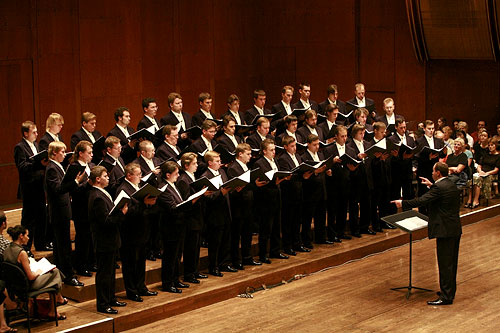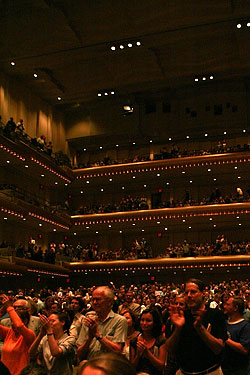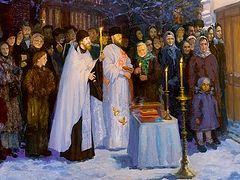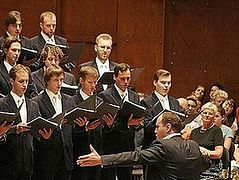September 6, 2007
In 1917, the workers’ paradise that was the Soviet Union forcibly removed the monks of the Moscow Sretensky Monastery and converted the 14th-century building into a torture chamber, sending the residents either to prison camp or death for living their lives according to the word of God. Not until 1994 was the place re-established as a religious institution and the present a cappella choir founded.
 Concert at Avery Fishery Hall, photo by Michael Rodionov / Pravoslavie.Ru Concert at Avery Fishery Hall, photo by Michael Rodionov / Pravoslavie.Ru |
| Concert at Avery Fishery Hall, photo by Michael Rodionov / Pravoslavie.Ru |
On the occasion of the reunification of the Orthodox Church within Russia to the greater Russian Orthodox Church, the 41-member choir is touring the world, singing primarily in sacred spaces but also taking some time out for public concerts. On Tuesday evening at Avery Fisher Hall, there was no room left for procrastinators, and the management had to provide seats on the stage to accommodate the overflow crowd.
English was clearly not the first language of most of these listeners, and there were more than a few hirsute men wearing flowing black robes. What they experienced was a thrilling evening of highly disciplined music making. The sacred side was represented by chants that ran the gamut from ancient to modern. «Stichera on the Dormition of Theotokos» was an extended plain-chant, while «Now the Powers of Heaven» was dramatically ethereal, and featured a truly impressive ensemble sound with eloquent crescendos.
 Concert at Avery Fishery Hall, photo by Michael Rodionov / Pravoslavie.Ru Concert at Avery Fishery Hall, photo by Michael Rodionov / Pravoslavie.Ru |
| Concert at Avery Fishery Hall, photo by Michael Rodionov / Pravoslavie.Ru |
«God Is With Us» had a 19th-century feel to it, with dramatic twists and turns like a sacred piece by Rossini or Verdi, while Piotr Dinev’s «It Is Truly Meet» harkened back to that timeless, hollow sound that, as a non-Russian, I can only compare to groundings in art, such as the music of the Old Believers in Modest Mussorgsky’s «Khovanchina.» Certainly there was a palpable sense of holiness that recalled many generations of martyrs.
But the other side of the same kopeck was revealed in the folk song set. «The Steppe So Wide» was deliciously mysterious, conjuring images of wolves and whiteouts, placing an individual man as but a lonely shadow or prey item. In fact, several of these numbers chilled to the bone.
For sheer beauty, it was difficult to beat «Evening Bells,» a ballad that channeled Rachmaninov with a sweet tenor solo by Andrey Bashkov. For poignancy, there was «Spring Shall Come, But Not for Me,» a Cossack pre-battle song. There were also those martial ditties with strong equestrian backgrounds such as «The Battalion Has Arrived» and songs of such infectious exuberance as the Ukrainian «Oh, to the Hills,» that made whistling seem appropriate. All were led with great skill and marvelous panache by conductor Nikon Zhila. The two most satisfying efforts were in this folk session. «Down the Mother Volga,» with its huge scope and superb blending, filled the cavernous hall with camaraderie and showcased this choir’s ability to produce not only one extraordinary sound but also to disclose each and every element of it, from high tenor to incredibly low bass. «The Steppe Is All Around» was also deeply moving, primarily for the operatic solo of Dmitri Beloselsky, who, if not for his higher calling, would make for a terrific Boris next door at the Metropolitan Opera.
Sadly, the evening was marred by literally dozens of cell phone rings, which, rather uncharacteristically, did not become rarer as the night wore on. But for those who came for a taste of home, not even technological rudeness could ruin such a special event.



